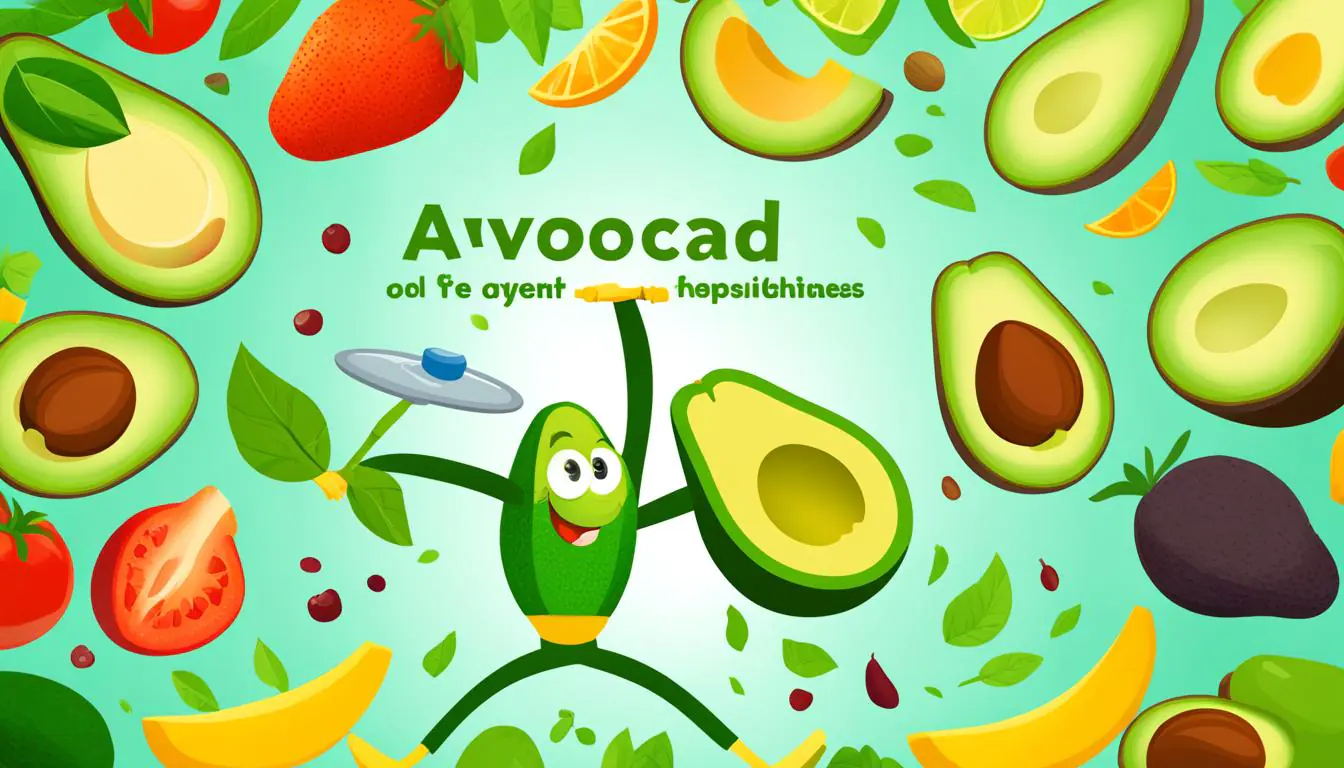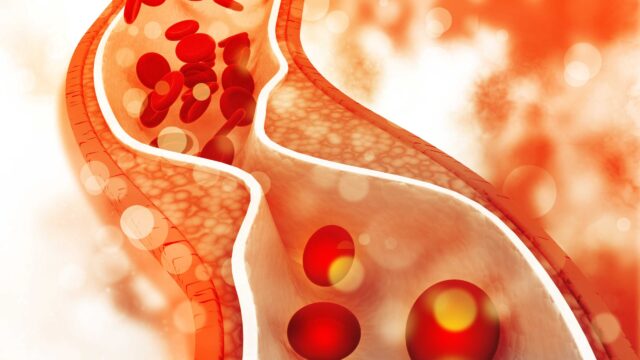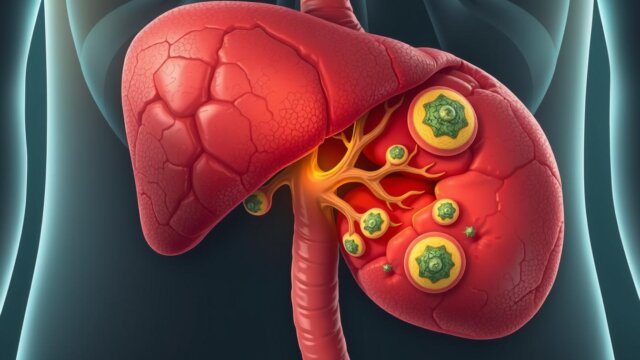FTC disclaimer: This post may contains affiliate links and we will be compensated if you click on a link and make a purchase.
Did you know one avocado has 76 milligrams of beta-sitosterol? This plant sterol helps keep your heart healthy. Avocados are full of nutrients that boost your health. They help with digestion and can lower cancer risk.
Avocados are a good source of healthy fats, vitamins, and minerals. Half an avocado provides 18% of your daily vitamin K, which is key for strong bones. Avocados are also great for heart health, boosting your immune system, and supporting a healthy pregnancy.
Key Takeaways
- Avocados are rich in healthy monounsaturated fats, vitamins, and minerals that can boost your overall health.
- Just one avocado contains a significant amount of beta-sitosterol, a plant sterol that can support heart health.
- Avocados are high in fiber, which can aid digestion and prevent constipation.
- Incorporating avocados into your diet may help reduce the risk of certain cancers, such as colorectal, lung, and bladder cancer.
- Avocados are a great source of folate, making them a valuable food choice during pregnancy and breastfeeding.
Excellent Source of Nutrients
Avocados are packed with avocado vitamins and avocado minerals. A medium avocado has 322 calories, 30 grams of fat, 17 grams of carbs, and 14 grams of fiber. They are full of vitamins C, E, K, and B6, plus other nutrients like potassium.
Potassium and Other Essential Vitamins
A single avocado provides 22% of vitamin C, 28% of vitamin E, 35% of vitamin K, and 30% of vitamin B6. It’s also full of potassium and other important minerals like magnesium and copper. It has more potassium than a banana, 487 mg compared to 422 mg.
Avocados Provide Vital Minerals
Avocados are not just for vitamins. They’re also a great source of avocado minerals. A medium avocado has 10 grams of fiber and 11 milligrams of sodium. They are a fruit full of B vitamins, folate, potassium, magnesium, and carotenoids.
Avocados are truly a nutrient-dense superfood. They can greatly improve your health and wellness.
“Avocados are a good source of healthy fats, fiber, and essential vitamins and minerals. Incorporating them into your diet can provide a variety of health benefits.”
Beneficial for Gut Health
Avocados are great for your gut health because they are full of fiber. Each one has about 14 grams of fiber, almost half what you need daily. This fiber is key for a healthy gut, helping good bacteria grow.
A study showed that eating avocados every day can lower bad bile acids and increase good bacteria in your gut. This can reduce inflammation and lower the risk of colon cancer.
Fiber-Rich for Digestive Wellness
Avocados have both soluble and insoluble fiber. This fiber slows down digestion, helps control blood sugar, and keeps your bowel movements regular. A 12-week study found that eating avocados made more fiber-breaking bacteria and healthy gut stuff.
People eating avocados had more fat in their poop, meaning they absorbed less fat from their food. This is good for people who are overweight or obese.
Promotes Healthy Gut Bacteria
Eating avocados can make your gut microbiome better and more diverse. A study looked at people in the US and found that eating Hass avocados meant eating better diets and having less chance of metabolic syndrome.
Another study showed that adding avocados to a diet helped people lose weight and change their gut bacteria for the better after 12 weeks.

“Avocados are a fiber-rich fruit that can help promote a healthy gut microbiome and improve overall digestive wellness.”
May Reduce Heart Disease Risk Factors
Eating avocados often can help keep your heart healthy. Studies show that eating avocados can make your heart healthier. It can raise good cholesterol, lower bad cholesterol, and keep blood pressure in check.
Avocados are full of potassium and magnesium, which help maintain blood pressure. They also have lots of dietary fiber and monounsaturated fats, which are good for the heart.
People who ate two avocados a week had a 16% lower risk of heart disease. They also had a 21% lower risk of coronary heart disease. Switching to avocados from some fats cut heart disease risk by 16% to 22%.
Some studies on avocados and heart health were funded by the avocado industry, but most studies show that avocados are good for the heart.
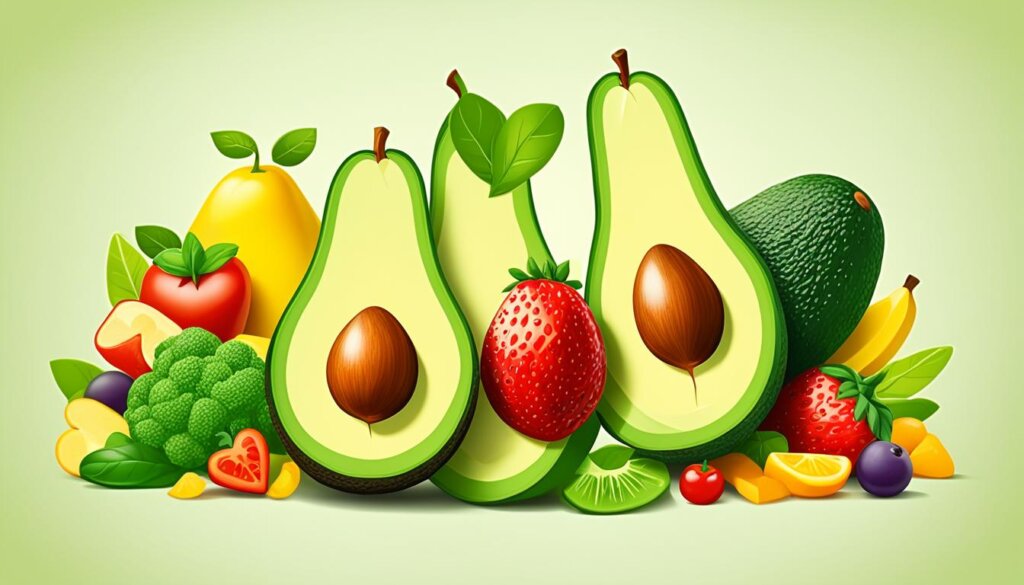
Rich in Antioxidants and Anti-Inflammatory Compounds
Avocados are full of bioactive compounds that fight off harmful free radicals. They have carotenoids like lutein, alpha-carotene, and beta-carotene. Plus, they have a lot of vitamin C, giving you 22% of your daily need in just one fruit.
Carotenoids and Vitamin C
Avocados’ carotenoids are strong antioxidants. They protect the body from damage that can lead to chronic diseases. Vitamin C in avocados is also key for fighting off free radicals and lowering oxidative stress.
Antioxidant Properties for Better Health
The mix of antioxidants and anti-inflammatory compounds in avocados boosts the body’s defense against oxidative stress and inflammation. Research shows that avocado compounds can stop dengue virus replication and fight fungi. They might also protect the brain and be good for the skin.
Studies on avocados highlight their role in preventing skin papilloma and affecting signaling proteins. This shows how eating avocados can improve your health in many ways.

“Avocados are a rich source of antioxidants, carotenoids, and other beneficial compounds that may help protect the body against oxidative stress and inflammation, which are linked to a range of chronic health conditions.”
Supports Healthy Weight Management
Avocados are high in calories but good for weight management because of their fiber and healthy fats. These nutrients make you feel full and satisfied, helping you eat less and stay healthy. Studies show that adding avocado to meals can make you feel full longer.
Fiber and Healthy Fats for Satiety
Research links regular avocado-eating with lower body weight and smaller waist size, even without cutting calories. The fiber and fats in avocados help move fat away from organs to under the skin. Also, avocado extract might reduce hunger and weight gain in animals.
Avocados are calorie-rich but packed with nutrients, making them great for a balanced diet. They have more calories than many fruits, like strawberries, but are still good for you.
The fiber and fats in avocados help you feel full and support weight management. But eat them in moderation as part of a calorie-controlled diet. More research is needed to understand how avocados affect weight management over time.
“Replacing some fats in the diet with avocado may decrease total cholesterol by an average of 18.8 milligrams per deciliter, and avocado diet decreased LDL cholesterol by 10% and total cholesterol by 8%.”
A study on overweight, obese adults found that eating avocados daily for 12 weeks reduced belly fat in women but not in men. A study on Seventh-Day-Adventist adults showed that eating avocados often was linked to a lower risk of gaining weight.
A study found that people who ate avocados were 33% less likely to be overweight or obese and had smaller waist sizes. Avocados are a low-calorie fruit that can increase fiber intake, helping with weight management.
The CDC estimates that about 70% of adults in the U.S. are overweight. Adding avocados to your diet and lifestyle can help with weight management and overall health.
Nutrient-Dense for Pregnancy and Breastfeeding
Expecting and new moms can get lots of good stuff from avocados. These fruits are full of important nutrients for pregnancy and breastfeeding. They give you almost 7 grams of fiber per half fruit, which is about 25% of what pregnant women need. Folate in avocados is key to preventing neural tube defects and other issues.
Avocados are also loaded with over 20 vitamins, minerals, and good plant stuff. A small 50-gram serving has 45 mcg of folate, 250 mg of potassium, 3 grams of fiber, and healthy fats. These are super important for moms and babies, helping with blood pressure, brain growth, and more.
Folate and Other Key Nutrients
Avocados have a lot of folate, which is important when pregnant. Eating enough folate can lower the chance of premature births and birth defects. They also give moms-to-be potassium, fiber, and healthy fats that are good for both mom and baby.
For breastfeeding moms, avocados are a great pick. The good stuff in avocados, like lutein and carotenoids, goes into breast milk to help the baby grow. Plus, avocados’ fiber and healthy fats can make new moms feel full and happy.
Adding avocados to the diet of pregnant and breastfeeding women is a great idea. You can eat them in smoothies, salads, or on avocado toast. With all the vitamins, minerals, and healthy fats they offer, avocados are a superfood for moms-to-be and new moms.
Versatile and Delicious Ingredient
Avocados are more than just healthy. They are also super versatile in the kitchen. They can improve many sweet and savory dishes. Avocado recipes show how well they can be used in different dishes. They can be used as a butter substitute or a creamy dip base.
Avocados work well in both sweet and savory dishes. They can replace butter, oil, or mayonnaise easily. You can use them 1:1 in baking and add your favorite seasonings to them.
Avocados are also great for your health. They are sugar-free and full of fiber and healthy fats. Adding them to your meals can help your digestion and might lower your risk of heart disease.
Try making avocado mayo, dressings, or aioli. You can also enjoy them on salads or sandwiches. Avocados offer endless possibilities in the kitchen.
Potential Benefits for Brain Health
Avocados might help keep your brain healthy and sharp. They are full of lutein, an antioxidant that helps the eyes and brain. Eating one avocado a day for six months can improve memory tests in older people, which shows that avocados, especially lutein, might boost brain power. The healthy fats in avocados also help your brain by making it easier for your body to use other good nutrients.
Lutein for Cognitive Function
More studies are needed, but avocados could be great for your brain. A study in Frontiers in Nutrition found that eating avocados often is good for your brain. They’re also good for young teens because of their healthy fats. Plus, they’re in diets for people with epilepsy because they protect the brain with healthy fats.
Research is showing that the Mediterranean diet, with lots of avocados, is good for your brain. This diet might help keep your brain sharp, lower your risk of Alzheimer’s disease, and slow down brain shrinkage in older people. Eating nuts, which are part of this diet, also helps older women think better.
Avocados are special because of their lutein and healthy fats. Eating avocados can thicken the pigment in your eyes and brain, which is good for your health. Studies also show that eating avocados can help adults with weight issues think better.
Research on avocados and brain health is becoming more exciting. Although more studies are needed, avocados are full of antioxidants and nutrients that could be good for the brain.
In Short, Avocado Benefits and Nutrition Value
Avocados are a superfood because they are full of nutrients and offer many health benefits. They are great for your heart, full of fiber, and packed with vitamins and minerals. They also have antioxidants and anti-inflammatory stuff that can lower the risk of chronic diseases. Eating avocados often can make your gut healthier, lower your risk of heart disease, and even help your brain work better. Adding avocados to your meals can make your diet better and keep you healthy.
Avocados contain monounsaturated fats that can protect your heart and help lower your blood pressure. They are also full of potassium, folate, and fiber, which are good for your heart and blood vessels. The fats in avocados, like oleic and linoleic acids, help keep your cholesterol levels in check. Plus, they make you feel full because of their fat and fiber, which can help you control how much you eat.
Avocados are also great for your eyes because they contain protective vitamins and antioxidants like vitamin E and carotenoids. They also contain folate, vitamin K1, and copper, which are important for your bones, blood clotting, and overall health.
With all these benefits, it’s easy to see why avocados are loved as a superfood. Adding this tasty fruit to your meals is an easy way to boost your health.
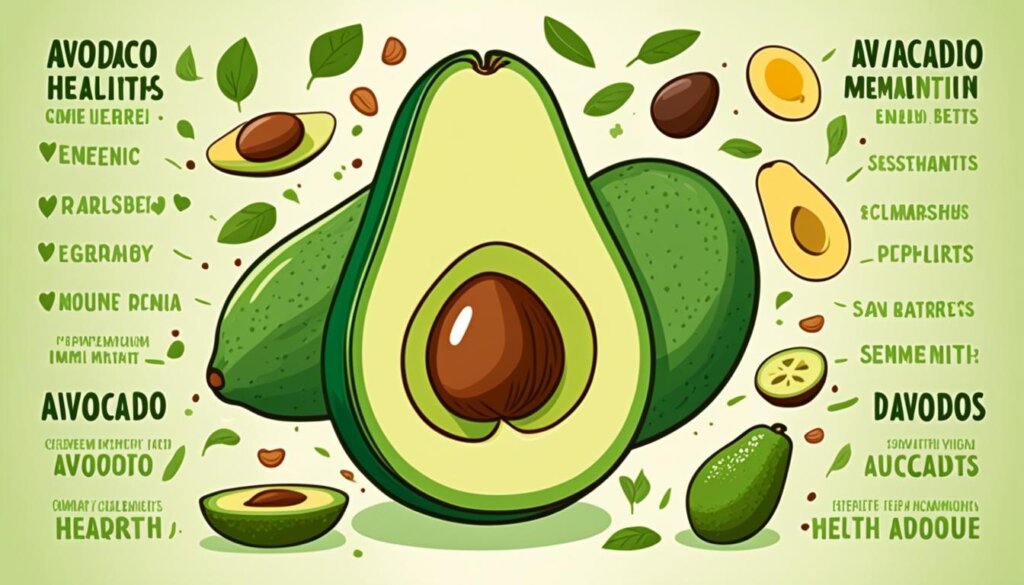
Nutrient | Amount in Half an Avocado | % of Daily Recommended Intake |
|---|---|---|
Monounsaturated Fats | 15g | – |
Vitamin K1 | 21 mcg | 21% |
Vitamin C | 10 mg | 11% |
Vitamin E | 4 mg | 27% |
Vitamin B6 | 0.25 mg | 12% |
Folate | 120 mcg | 20% |
Fiber | 7g | 25% |
Potassium | 485 mg | 14% |
Copper | 0.4 mg | 20% |
“Avocados are a powerhouse of nutrients, making them a super-fruit with various health benefits.”
Conclusion
Avocados are a superfood packed with nutrients. They give you healthy fats, fiber, vitamins, minerals, and antioxidants. These can help with heart health, gut function, weight, and brain function. People who eat avocados eat more veggies, fruits, fiber, and important vitamins and minerals. They also eat less sugar. They tend to be lighter, have a lower BMI, and a smaller waist. They also have higher HDL-C levels and are less likely to have metabolic syndrome.
Adding avocados to your healthy eating plan can boost your nutrition and health. Avocados are loved worldwide, especially in Mexico and Brazil. They can be used in many dishes, making them a tasty and healthy choice. If you want to improve your heart health and gut function or just eat better, avocados are a great pick.
FAQ
What are the key nutrients found in avocados?
Avocados are full of healthy fats, vitamins, and minerals. They contain vitamins C, E, K, and B6, as well as riboflavin, niacin, folate, pantothenic acid, magnesium, and potassium.
Avocados give you lutein, beta-carotene, and omega-3 fatty acids too.
How do the nutrients in avocados benefit digestive health?
Avocados are rich in fiber, with about 14 grams per fruit. This fiber helps good gut bacteria grow. It also slows digestion, controls blood sugar, and keeps bowel movements regular.
Can consuming avocados help reduce the risk of heart disease?
Yes, eating avocados often can lower your risk of heart disease. They contain vitamins, minerals, healthy fats, and fiber, which can boost HDL (good) cholesterol, lower LDL (bad) cholesterol, and control blood pressure.
What are the antioxidant and anti-inflammatory properties of avocados?
Avocados are full of bioactive compounds like carotenoids, vitamin C, vitamin E, and phenolic compounds. These have strong antioxidant and anti-inflammatory effects. They help fight oxidative stress and inflammation linked to many health issues.
How can avocados support healthy weight management?
Avocados are high in calories but can aid in weight management. Their fiber and healthy fats make you feel full and satisfied. This can prevent overeating and help with weight control.
What are the benefits of incorporating avocados into a pregnant or breastfeeding woman’s diet?
Avocados are great for pregnant and breastfeeding women because they’re nutrient-rich. They have folate, vitamin C, potassium, and vitamin B6, which are important during pregnancy and breastfeeding.
How can avocados benefit brain health and cognitive function?
Avocados are loaded with lutein, an antioxidant found in the eyes and brain. Eating avocados may boost memory in older adults. This shows that their nutrients, especially lutein, support brain health.
